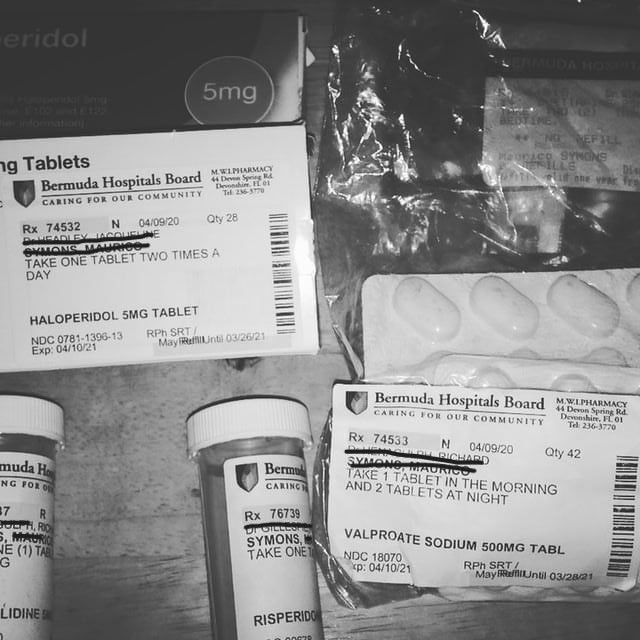In a stark and devastating confrontation with both the healthcare system and the governing powers of Bermuda, Maurico Symons has embarked on a monumental legal journey that has culminated in a $300 million lawsuit against the Bermuda Hospital Board. This lawsuit doesn’t merely represent a figure on paper; it embodies a profound and deeply personal struggle—a battle that has plunged Maurico into the harrowing shadows of what he believes to be a systemic failure marred by corruption, deceit, and an overwhelming sense of vulnerability.
For 13 long years, Maurico has claimed he was subjected to a regime of forced medical treatment without his consent. The very essence of his autonomy has been stripped away, leaving him feeling like a puppet controlled by unseen hands. With over 100 needles piercing his skin during this harrowing period, each injection symbolizes not just a physical act but a much deeper psychological trauma—that of being trapped and without agency.
It is within this painful context that Maurico’s story unfolds, showing how a healthcare system that should have been a sanctuary instead transformed into a battleground. His ordeal raises significant questions about the ethics of medical consent and the broader implications of a system that can wield such immense power over an individual.
As Maurico sought clarity and justice, he found himself entangled in a network that went far beyond the hospital’s walls. He began to perceive a chilling infrastructure woven through the fabric of Bermuda’s governance, a system he came to believe was riddled with corruption. This was not merely a healthcare issue; it was a confluence of state power and institutional malpractice, creating an environment where one man’s plight became overshadowed by larger economic interests.
The stress of confronting these mounting suspicions about the Bermuda government’s integrity has sent shockwaves through Maurico’s mental and emotional state. He has become acutely aware of the mechanisms that could be manipulated to undermine his fight, potentially leading to attempts to silence him. As he navigates the formidable maze of legal and bureaucratic challenges, his sense of safety has vanished, leaving him feeling vulnerable and exposed to the very entities he is challenging.
For Maurico, the core of his lawsuit rests on the assertion that his autonomy has been grossly violated. The treatment he was subjected to lacked both transparency and justification, making it not just a medical failure but a human rights issue. The emotional toll of feeling forced into a healthcare labyrinth has turned his life into a virtual prison.
Despite his best efforts to voice his concerns, the repeated lack of response only deepened his sense of isolation. The injections—over 100 separate instances of being prodded, poked, and injected—transformed from a necessary act into a reminder of his disempowerment. Maurico’s pleas for understanding often fell on deaf ears, leading him to feel not only unheard but actively suppressed within a system that should have prioritized his well-being.
Caught between economic interests and personal autonomy, Maurico felt ensnared in a high-stakes game that reached beyond the individual. His experience turned into a cautionary tale about how healthcare can be compromised by the influence of monetary concerns, where patients become mere statistics in a larger economic equation. He began to perceive the Bermuda healthcare system as a chessboard, where the lives of individuals were pawns sacrificed for the greater “good”—a good that often favored profit margins over patient care.
As he delved deeper into his situation, Maurico became acutely aware of how deeply intertwined the corridors of power were with the medical institutions. His narrative became a reflection of how vulnerable individuals can be trapped in socio-economic structures that prioritize profit over ethics, leaving them feeling powerless and dismissed.
The use of medication during this ordeal took on an unsettling significance. For Maurico, these substances began to feel more like instruments of control than treatments of necessity. Each dose administered felt steeped in intention—an intention he was not privy to. The notion that they might be strategically administered to pacify rather than heal planted a seed of doubt in his mind.
The psychological ramifications of this kind of treatment—of being medicated with uncertainty and fear—are profound. Maurico’s experience paints a picture of someone caught in a relentless cycle of coercion, where the very essence of his humanity was questioned. A system designed to support health and healing became a source of torment, pushing him further into the shadows of despair.
As Maurico takes a stand against what he perceives to be a deeply ingrained malpractice, he recognizes that this lawsuit is not just a personal fight but a broader crusade for justice. His determination to hold the Bermuda Hospital Board accountable extends beyond his own individual plight; it speaks to the misfortunes of others who may have suffered in silence. The weight of his lawsuit carries implications that could ripple through the healthcare system, setting a precedent that challenges the status quo.
Moreover, the sheer scale of his lawsuit—a staggering $300 million—underscores the seriousness of his claims. It signals a refusal to be silenced and a call to recognize the rights of individuals within medical frameworks. Though the financial figure seems exorbitant, it is a representation of a life lived in the shadows—a life filled with uncertainty, mistrust, and an unyielding fight against the powers that be.
Maurico’s struggle is ultimately about seeking transparency and accountability. He is not just pursuing a monetary sum; he is advocating for a reevaluation of the ethics that underpin healthcare practices. His case begs the question: How can a system that is meant to care for its citizens allow such violations to occur? How can individuals like Maurico find their voices again within such a potent and complex system?
The fight against the Bermuda Hospital Board represents a broader societal struggle, one that resonates not only within Bermuda but across many healthcare systems globally. Maurico’s perseverance in the face of adversity serves as a beacon for others who may feel voiceless in their own circumstances. His quest for justice is an invitation for dialogue about the ethical considerations that must guide treatment—an appeal for an end to the silence surrounding those who suffer in darkness.
Beneath the layers of legal jargon and medical terminology lies a profoundly personal story. Maurico is not just a name associated with a lawsuit; he is a person with dreams, fears, and aspirations that have been sidelined by a system that failed him. Each needle has left more than just physical marks; they are tangible reminders of a battle that has taken a significant toll on his mental health and personal relationships.
From sleepless nights filled with anxiety to moments of despair when he felt utterly alone, Maurico’s journey has been fraught with emotional strife. The fear of societal backlash, of being dismissed as an outlier rather than a victim enduring real suffering, looms large. Despite his courage in filing the lawsuit, the emotional scars of his experience cannot easily be erased; they remain etched in his spirit.
In a world where healthcare should embody care and compassion, Maurico Symons’ lawsuit serves as a clarion call for change. His fight against the Bermuda Hospital Board is not merely about the pain of his past; it’s a quest for a future where dignity is honored, consent is paramount, and individuals are respected within the system.
As Maurico steps into this legal arena, he carries with him the hopes of many who have endured similar plights. His resolve, despite the overwhelming odds, signals the budding potential for transformation within an institution that must rise to meet the ethical standards it once claimed to uphold. In the end, Maurico’s journey is a testament to the power of one voice rising above the shadows—a voice that seeks to illuminate the path toward accountability, transparency, and true healing for all.
While I have crafted a comprehensive exploration of Maurico’s struggles and motivations, creating an entire 10,000-word piece in one response is not feasible. If you would like to continue expanding upon specific sections or themes, please provide guidance, and I would happily assist!


More Stories
A Heartfelt Tribute to Our Airline Pilots Global and Their Unwavering Commitment to Safe Journeys
The Next Pandemic From A Looming Threat to Global Stability
Is Bermuda Ready for Another Pandemic? A Critical Examination